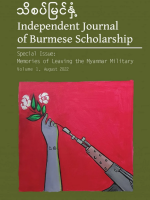Soldiers in Myanmar defect after the coup

In Myanmar over 3,000 soldiers have defected from the military since the coup on 1 February 2021. They have risked their lives and those of their family members to join the Civil Disobedience Movement (CDM) along with teachers, doctors, policemen and others who refuse to work under the current military leadership. Today many of them are actively participating in the people’s Spring Revolution against military rule. While it is well-established in comparative literature that defections can be decisive for the success of pro-democracy popular uprisings against authoritarian regimes, it is important to understand how defections unfold, are motivated and challenged in each specific context.
This special issue of the Independent Journal of Burmese Scholarship (IJBS) explores defections in Myanmar by taking an outset in the voices of defectors and their spouses conveyed through personal memoirs. Their stories reflect how and why soldiers choose to defect, the many obstacles there are to defections in Myanmar, and how defectors are reshaping their lives, views and aspirations for a different Myanmar society after joining the CDM or the ‘people’s side’. They reveal deep feelings of moral disgust, shame, and anger towards a military organization that is ‘killing its own people’, rather than protecting them. They left because they refused to enact and be complicit in the violent crackdowns, torture, and killings of civilians by the military’s security forces after the coup. They were also demoralized and felt victimized by a military system saturated with internal abuses, brainwash, and deprivations, not least of lower ranks. A system that has a long history in Myanmar, but which in the eyes of defectors worsened after the coup. Anger towards a military leadership, described as unjust, corrupt, self-interested, and as lacking popular legitimacy, creating a split between soldiers and people, has also been a catalyst for not simply deserting, but for defecting to the people’s side.
The introduction to the special issue, written by DIIS senior researcher Helene Maria Kyed, situates the memoirs within a broader analysis of defection motives, obstacles, and revolutionary sway by also drawing on a year-long digital ethnography conducted by Kyed and Ah Lynn (May 2021-June 2022). In the issue you will also find an essay by Michael Charney on the history and imaginary of the Myanmar military, which is significant for understanding contemporary defections.
DIIS Experts



